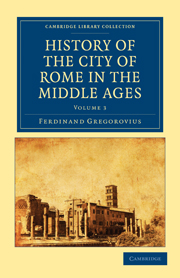CHAPTER V
Published online by Cambridge University Press: 05 July 2011
Summary
The personal weakness of Charles's successors, their despicable passions, their quarrels with regard to the monarchy, which was irrevocably disorganised by feudalism, had at this time greatly increased the authority of the Pope. Nicholas the First united the sacred dignity with an intrepid spirit such as but few Popes have possessed. Distinguished birth, physical beauty, education, as good as the times permitted, were combined in him ; and since Gregory the Great no Pope had been favoured to such a degree by the good fortune which power attracts to itself. He succeeded in humiliating the royal as well as the episcopal power, and the enfeebled Empire sank under Lewis, who had no male heir, and who, so to speak, buried it in a series of energetic but petty and endless wars in Southern Italy, into a more and more empty name. Meanwhile, however, in the Papacy there arose the idea of universal spiritual monarchy, which was later erected by Gregory the Seventh and perfected by Innocent the Third. The conception of Rome as the moral centre of the world still lingered in imperishable tradition.
- Type
- Chapter
- Information
- History of the City of Rome in the Middle Ages , pp. 151 - 187Publisher: Cambridge University PressPrint publication year: 2010First published in: 1895

